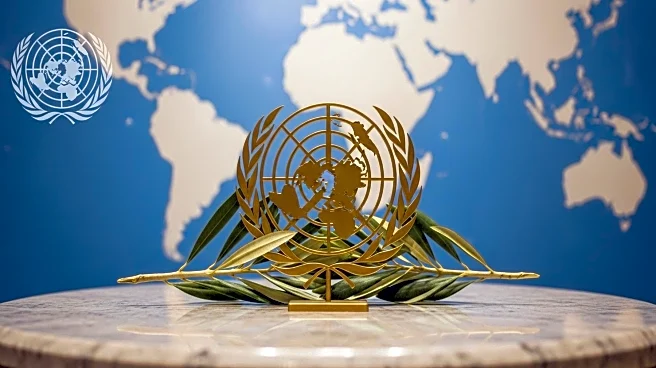What's Happening?
Ahmed al-Sharaa, a former al Qaeda leader, has arrived in New York to attend the United Nations General Assembly (UNGA), marking the first time a Syrian leader has participated in UN meetings since 1967. Al-Sharaa, who previously had a $10 million bounty on his head, gained significant recognition from President Trump during a meeting in Riyadh in May. This development follows his role in forming the new Syrian government, which was announced on March 29, 2025. Al-Sharaa's presence at the UNGA signifies Syria's re-engagement with international diplomacy after years of isolation due to ongoing conflicts and political instability.
Why It's Important?
Al-Sharaa's participation in the UNGA is a pivotal moment for Syria, signaling a potential shift in its international relations and diplomatic standing. This move could lead to increased dialogue and cooperation with other nations, potentially impacting regional stability and international policy regarding Syria. The recognition by President Trump may also influence U.S.-Syria relations, possibly opening avenues for negotiation and collaboration on issues such as counter-terrorism and humanitarian aid. The broader implications for Middle Eastern geopolitics are significant, as Syria's re-entry into the international arena could alter alliances and power dynamics in the region.
What's Next?
Syria's re-engagement with the UN may lead to further diplomatic initiatives and discussions aimed at resolving ongoing conflicts within the country. Major stakeholders, including the U.S., Russia, and regional powers, may respond with varying degrees of support or opposition, depending on their strategic interests. The international community will likely monitor Syria's actions closely, assessing its commitment to peace and stability. Future UN meetings and bilateral talks could shape the trajectory of Syria's foreign policy and its role in global affairs.
Beyond the Headlines
The ethical and legal dimensions of al-Sharaa's past as a former al Qaeda leader may raise concerns among international observers and human rights organizations. His transition from a wanted figure to a recognized political leader underscores complex issues surrounding accountability and reconciliation in post-conflict governance. This development may prompt discussions on the balance between diplomatic engagement and justice for past actions, influencing how similar cases are approached globally.











